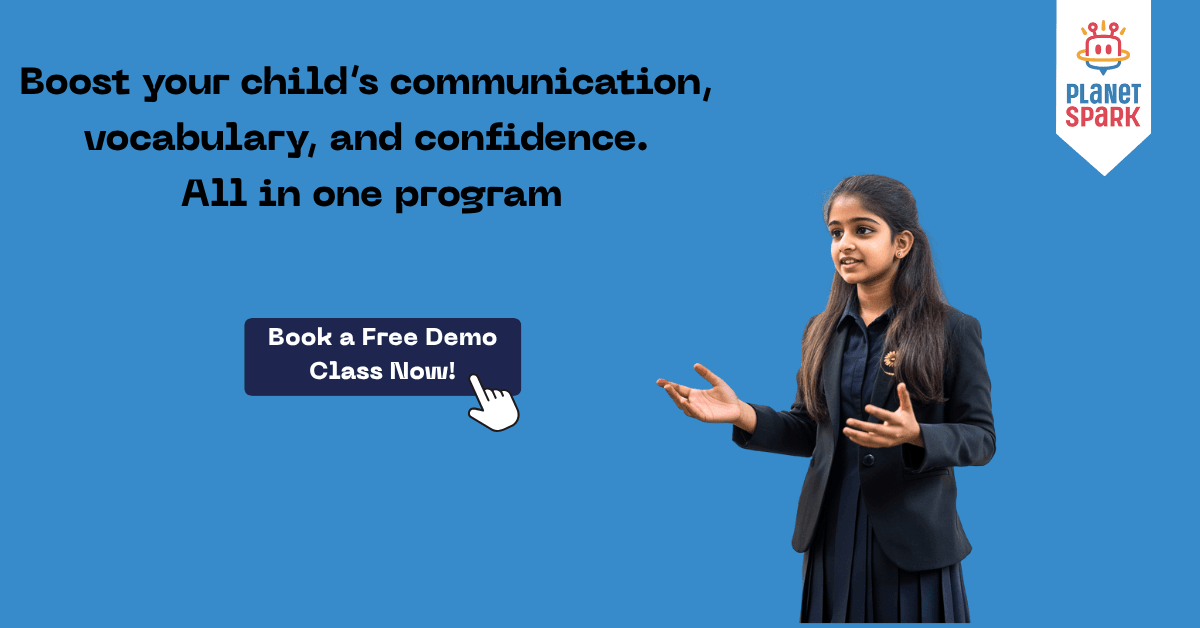How to Improve Communication: A Guide for Students

Table of Contents
Communication skill is the ability to express your thoughts clearly, confidently, and persuasively—an essential asset in today’s world. Strong speaking skills can help you succeed in every area of life, whether you're taking part in a classroom debate, writing an essay, or simply having a conversation with a friend.
If you're wondering how to improve communication, you're in the right place. This blog will walk you through the complete journey of becoming an effective communicator, using easy-to-understand techniques, real-world examples, and insights from PlanetSpark’s Spoken English course.

What is Communication Skill?
Before looking deep into knowing the tips on how to improve communication, let’s have a basic understanding on: What is communication skill?
Communication skills refer to the ability to transmit information clearly and effectively. There are particularly four types of communication, including:
Verbal communication (speaking)
Non-verbal communication (gestures, expressions)
Written communication (emails, essays)
Listening skills (active listening, empathy)
At its core, the communication process includes a sender, message, channel, receiver, feedback, and any noise that can disrupt the message. Mastering each part of this process helps you speak and improve with confidence.
Importance of Communication
The importance of communication goes far beyond just passing exams or responding to questions in class. Strong communication skills are among the most vital soft skills and have a direct influence on the following areas:
Academic success
Public speaking confidence
Leadership and teamwork
Career readiness
Interpersonal relationships
At PlanetSpark, communication isn’t taught as theory. It’s taught through live conversations, storytelling, debates, and real-life speaking tasks to make it second nature. Let’s understand How Effective Communication can improve the quality of life.
Types of Communication
To know how to improve communication, you first need to understand the types of communication. Here are the four main types:
1. Verbal Communication
It refers to spoken communication anything you say aloud. This can include conversations, speeches, presentations, or phone calls. PlanetSpark helps kids improve verbal communication through daily live speaking classes, situational dialogues, and storytelling modules.
2. Non-Verbal Communication
This includes your tone, facial expressions, gestures, and body language. For example, a strong handshake or eye contact can show confidence even before you speak.
3. Written Communication
Important for writing essays, emails, or social media posts. Written words also require clarity, structure, and a strong vocabulary.
4. Visual Communication
Infographics, signs, and symbols fall under this category. It’s often used in presentations or reports to support verbal or written communication.
PlanetSpark’s teaching method uses a blend of all types of communication to ensure students are confident across situations. Book a Free Trial and see the results for yourself.
Difference between Verbal and Non-Verbal Communication
A truly effective speaker uses both verbal and non-verbal communication together. Imagine saying, “I’m excited to be here,” with a bored expression and slouched posture, it sends mixed signals.
To improve both:
Practice clear pronunciation
Use expressive hand gestures
Maintain good posture and eye contact
Match your tone with your message
These are exactly the elements PlanetSpark emphasizes in its voice modulation and body language modules.
How to Improve Communication: Step-by-Step
From the foundational years of a child, it get important to start the process of Mastering English Communication Skills. Get below a step-by-step practical guide to understand how to improve communication. Follow these practical strategies to speak and improve every day:
Speak Every Day: The more you speak, the more comfortable you become. Talk to your parents, participate in class, or even practice in front of a mirror. At PlanetSpark students engage in live, real-life dialogues like explaining a recipe or narrating a story. Let’s understand here the complete details to improve public speaking in kids.
Listen to Others: Effective communication begins with being a good listener. Active listening shows respect, builds trust, and allows you to truly understand the speaker’s message. It also helps you respond thoughtfully and avoid misunderstandings. Practice by maintaining eye contact, avoiding interruptions, and summarizing what you hear to improve over time.
Read Aloud to Improve Fluency: Reading aloud boosts vocabulary, pronunciation, and speaking confidence. Start with simple texts like storybooks or newspapers, and focus on clarity, tone, and expression. Regular practice helps you speak more naturally and fluently.
Learn One New Word Daily (Start with basic words): Building your vocabulary helps you communicate more clearly and confidently. Focus on simple, useful words first, as clear and common language is often more effective than complicated terms. Make it a habit to use the new word in sentences throughout the day to reinforce learning. Learn vocabulary contextually through dialogues, not by memorizing lists with PlanetSpark.
Record and Watch It: Recording yourself while speaking is a great way to evaluate your communication style. It helps you notice your speaking pace, tone, body language, filler words, and overall clarity. Watching the playback allows you to pinpoint areas that need improvement. Regular video feedback loops accelerate self-awareness and boost speaking confidence.
Join Public Speaking Platforms: Engaging in debates, panel discussions, and storytelling events allows you to actively apply and refine your communication skills. These platforms expose you to diverse speaking styles and audiences, helping you become more adaptable and persuasive. Participating in competitions boosts confidence and gives you space to command over different types of public speaking.
Learn Interpersonal Communication: Interpersonal communication refers to the way you interact one-on-one or in small groups. It involves:
- Understanding social cues
- Showing empathy
- Speaking with clarity and purpose
- Being aware of tone and body language
PlanetSpark integrates interpersonal communication skills in kids in its every lesson, helping students become more emotionally intelligent and socially confident.
7 Cs of Communication

The 7 Cs of communication offer a checklist to ensure your message is effective:
Clear – Say exactly what you mean
Concise – Be brief but complete
Concrete – Use facts and specifics
Correct – Use the right grammar and tone
Coherent – Stay logical and organized
Complete – Give all necessary information
Courteous – Be polite and respectful
Start Learning with PlanetSpark Spoken English Course
PlanetSpark’s Spoken English course is designed to help children speak and improve their communication skills holistically. Here's what sets it apart:
- Live, Interactive Conversations: No recorded videos. Kids speak daily in real-life situations
- Accent Neutralization: Reduce mother tongue influence with focused phonetics training
- Vocabulary Enhancement: Learn words through natural conversation, not difficult words lists
- Situational Dialogues: Role plays based on real-life situations like ordering food or making a phone call
- Instant Feedback: With AI-powered fluency reports and personal trainer reviews
- Global Peer Interaction: Students from 13+ countries participate, building real communication experience
- Public Speaking Training : TED-style modules to boost confidence and stage presence
With the expert guidance of a platform like PlanetSpark, you can accelerate this journey and help your child thrive in every aspect of life.

Conclusion
The journey of mastering communication is not just about learning how to speak, it’s about learning how to connect. Whether it’s delivering a class presentation or chatting with friends, the ability to communicate clearly and confidently can open doors to endless opportunities. So if you're wondering how to improve communication, remember: it’s a step-by-step process. Read more, speak often, listen deeply, and most importantly practice consistently.
Frequently Asked Questions
Q. What is the best way to improve your communication skills?
A. The best way to improve communication skills is through regular speaking practice, listening actively, building vocabulary, and receiving constructive feedback. PlanetSpark’s live interactive sessions, situational dialogues, and AI fluency reports ensure structured growth and real-time improvement in spoken English.
Q. What are 7 good communication skills?
A. Seven key communication skills include:
Clear articulation
Active listening
Confident body language
Vocabulary usage
Proper tone and voice modulation
Structured speech delivery
Respectful interaction
Q. What is Verbal communication?
A. Verbal communication is the use of spoken words to convey messages, whether in conversations, presentations, or debates. PlanetSpark helps children master verbal skills through daily speaking practice, pronunciation coaching, and accent neutralization modules.
Q. What is Non-Verbal communication?
A. Non-verbal communication includes gestures, facial expressions, posture, eye contact, and tone of voice. At PlanetSpark, children are trained in body language and voice modulation to deliver impactful messages beyond just words.
Q. What are the 7 steps of effective communication?
A. The 7 steps of effective communication are:
Develop the message
Choose the right channel
Deliver with clarity
Use appropriate tone and body language
Encourage feedback
Listen actively
Adjust based on understanding
PlanetSpark integrates these steps into its speaking confidence tracker and live mentor-led sessions for holistic communication development.
Personalized Communication Report
Record a video to get a AI generated personalized communication report for your child

Hi There, want to try these
tips for your child with
LIVE with our expert coach?
Let's check your child's
English fluency
